Paco Lopéz
A Reef Resilience Network Manager’s Story
Isla Verde Marine Reserve
Isla Verde is a popular tourist destination in Puerto Rico because of its white sand beaches, crystal blue water, and location next to Puerto Rico’s largest and most populated city, San Juan. Close proximity to the city means Isla Verde’s coastal waters and coral reefs are subject to the pressures of urban development and tourism. One pressure is sanitary overflows, where wastewater and stormwater floods streets and flows into the ocean. Sanitary overflows occur because of outdated infrastructure and blocked pipes. As these overflows became more frequent along San Juan’s coast, water quality declined, directly impacting the health and productivity of coral reefs in the Isla Verde Marine Reserve. The 3.85-kilometer reserve is home to endangered species such as manatees, sea turtles, and elkhorn coral. The reef is also important for fish spawning, which supports the region’s fishing industry.
Meet the Manager
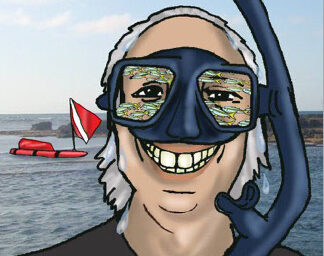
Paco Lopéz self portrait. Photo © Paco Lopéz
Paco Lopéz is an active board member of Arrecifes Pro Ciudad, a community-based organization in Isla Verde that is dedicated to marine life conservation through a collaborative agreement with the Department of Natural Resources. Arrecifes Pro Ciudad is working to stop the disposal of cooking oil down kitchen drains, which builds up over time and blocks sewage pipes from carrying wastewater to treatment plants. The Puerto Rico Water Authority has spent millions of dollars unclogging sewage outflow pipes that have been clogged with cooking oil. When outflow pipes are clogged, sewage lines overflow onto beaches near the marine reserve, impacting water quality and coral health.
“The connection between cooking oil and coral reefs isn’t obvious. Our culinary culture involves lots of frying. When oil goes down drains, it clogs pipes and can cause wastewater spills that harm corals.”—Paco
Prior to becoming an Arrecifes Pro Ciudad board member and a marine conservationist, Paco’s main focus was graphic design. After becoming a board member, Paco began using his graphic design skills to educate residents about the harmful impacts cooking oil has on coral reefs by creating fun and informative visuals. As Paco became more involved in the Isla Verde Marine Reserve’s education and outreach programs, he found it important to increase his knowledge of coral reef management and conservation to strengthen the message behind his art.
Reef Resilience Network Support
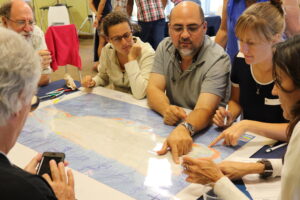
Paco (third from right) at the 2015 training in Puerto Rico. Photo © TNC
In 2015, Paco participated in a 15-week online course and a five-day, in-person training hosted by the Reef Resilience Network (the Network). These trainings covered topics such as local and global threats affecting coral reefs, guidance for identifying coral reef resilience strategies, and design principles for resilient marine protected area (MPA) networks. Paco applied the concepts and tools from the course and in-person training to his work developing a cooking oil recycling program for condominiums in Isla Verde to reduce sanitary drain blockages. By the end of the training—and with support from Network experts and trainers—Paco completed a plan for implementing the cooking oil recycling program in Isla Verde.
The Network provided additional support to Paco by funding the creation of a graphic manual, which Paco and Arrecifes Pro Ciudad are using to educate residents on the damage uncollected cooking oil causes to coral reef ecosystems, coastal communities, and the local tourism industry. The educational manual that Paco created tells the story of how efforts on land play an important role in coral reef health, and Paco hopes it will inspire residents to participate in the cooking oil recycling program. The manual also informs residents how the program works and includes a visual step-by-step guide for how to properly collect and dispose of cooking oil after it has been used. “The support from the Reef Resilience Network training was so important to me and is what really sparked the cooking oil recycling project.”—Paco
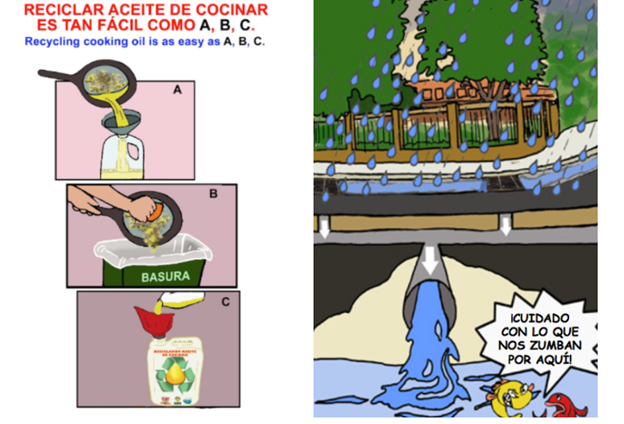
Images from the graphic manual Paco created with seed funding. Photo © Paco Lopéz
Success and Next Steps
Paco targeted outreach to condominiums located near the Isla Verde Marine Reserve where most residents dispose of used cooking oil down the drains. To recruit condominiums to join the cooking oil recycling program, Paco attended community meetings at condominiums and presented his manual to the residents, describing how they can take action in their homes to improve water quality with no associated costs. He has distributed thousands of manuals to date. The community meetings and educational materials helped residents of Isla Verde understand the importance and value of collecting used cooking oil. As of 2023, seven condominiums have joined the cooking oil recycling program, and Paco also helped a nearby community center begin a similar cooking oil recycling program. The program installed large collection containers on every floor of a condominium so residents can easily dispose of used cooking oil. Once the collection containers are filled, they are collected by Cease the Grease (a local nonprofit) at no cost to the residents. Collected cooking oil is then sold and used as an ingredient in animal feed.
Paco is currently investigating the potential of involving a local fast-food restaurant chain in collection efforts. Residents could bring their used oil to the restaurants’ existing collection bins, where weekly oil pickup already occurs. Working with fast-food restaurant chains has the potential to greatly increase the impact of collection efforts.
“Paco’s project has been extremely successful. With a small amount of funding, he was able to start a project that has a huge impact on the nearby coral reef and that is being considered for other areas of Puerto Rico.”
—Aurora Justiniano-Santos, Puerto Rico Coral Reef Conservation and Coastal Zone Management Liaison, National Oceanic and Atmospheric Administration (NOAA) Office of Coastal Management
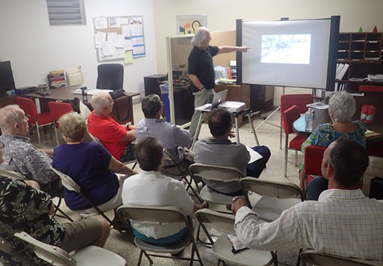 Paco presenting to Isla Verde condominium residents. Photo © Paco Lopéz |
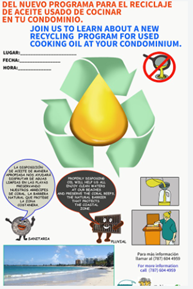 Visual from Paco's graphic manual about how to recycle used cooking oil. Photo © Paco Lopéz |
To determine the long-term impact of the cooking oil recycling program, Arrecifes Pro Ciudad pursued partnerships to collect water quality data in the reserve. After hurricane Maria hit Puerto Rico in 2017, the Isla Verde Marine Reserve management board received additional support from The Nature Conservancy and NOAA to develop a water quality monitoring program for the marine reserve. Arrecifes Pro Ciudad began measuring temperature, acidity, dissolved oxygen, salinity, and turbidity twice a week. Additional funding from the Environmental Protection Agency (EPA) Equipment Lending Program, the Surfrider Foundation, and the Chelonian Research Fund allowed Arrecifes Pro Ciudad to continue its water quality monitoring program and sample for bacteria. The group posts and interprets the results on its website and Facebook page once a week.
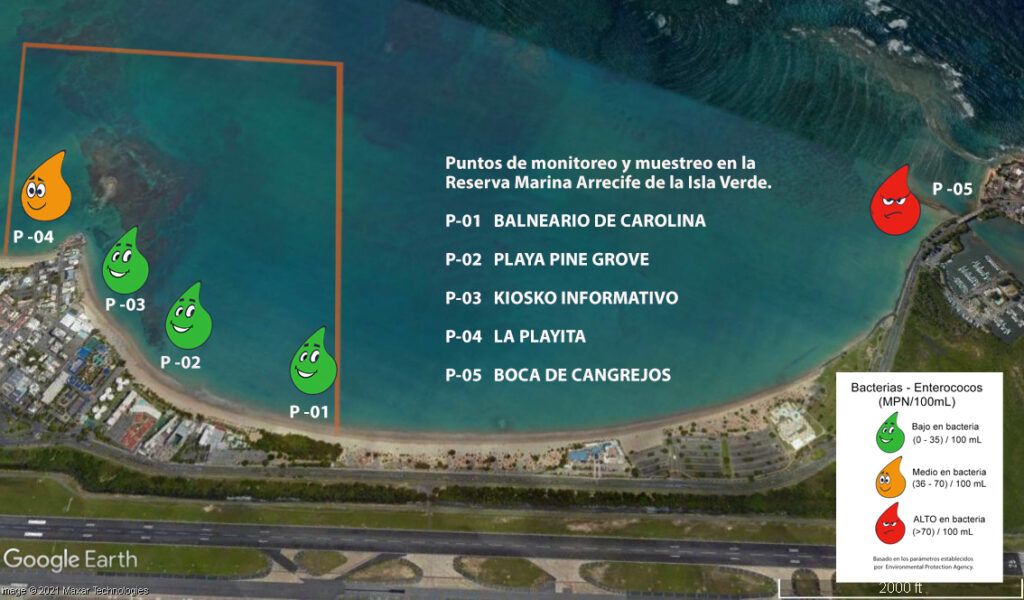
2021 water quality monitoring map. Photo © Paco Lopéz
Unfortunately, despite the reduction in wastewater pollution and the increase in water quality monitoring, in the last four years Isla Verde corals have been impacted by hurricanes and stony coral tissue loss disease. Paco reports that since 2020, corals in the marine reserve have declined significantly and Acropora palmata and Pseudo diplorias colonies have been lost. Reserve managers have been treating the infected corals with antibiotics, but recovery has been slow. However, actions like Paco’s—reducing wastewater pollution and monitoring water quality to inform management actions—are critical steps in improving water quality and reef health in the Isla Verde Marine Reserve.
